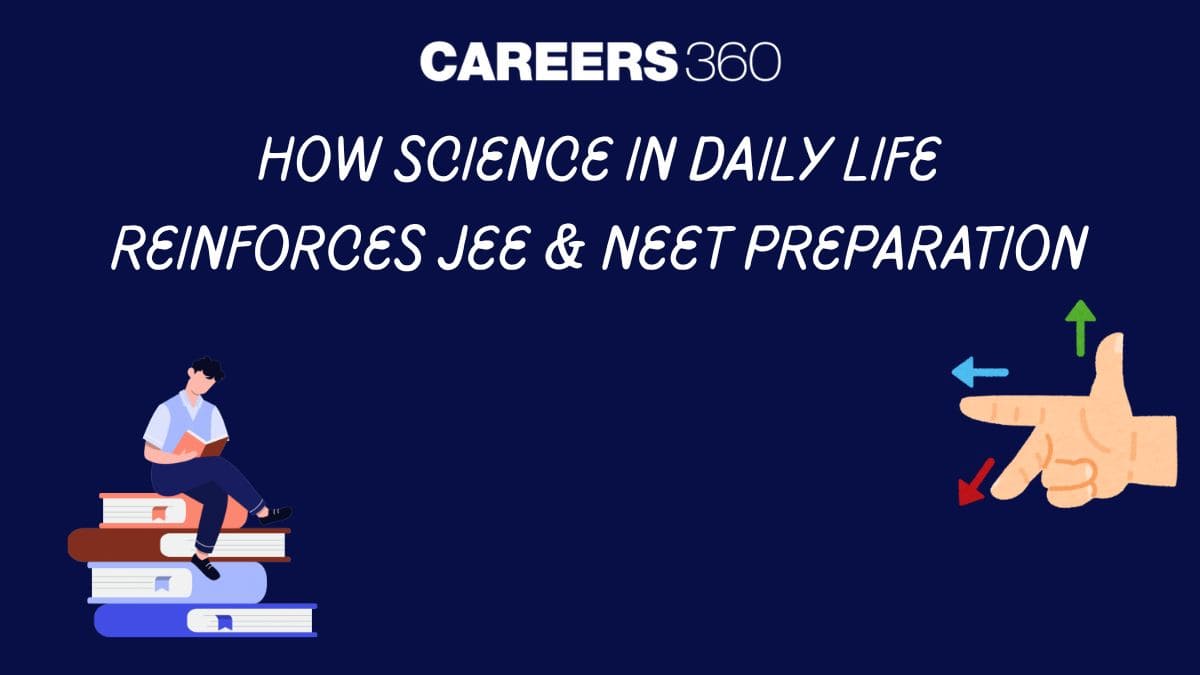How Science in Daily Life Reinforces JEE & NEET Preparation
How Science in Daily Life Reinforces JEE & NEET Preparation - Vivek Taparia, a senior faculty member at Allen Careers Institute, shares how daily life hacks teach one JEE & NEET principles. In a conversation with Careers360, Vivek Taparia highlights how science in daily life reinforces JEE & NEET preparations. He explains how the scientific principles have a real life impact in navigating through our daily lives. He believes that science isn’t confined to books but has a practical application even in the simplest of day-to-day activities. JEE and NEET aspirants can deepen their understanding of the concepts by correlating the real life applications with textbooks. He further explains five common scenarios that use some or the other scientific principles.
The steps to check NTA JEE Main 2026 result are as follows.
- Visit the JEE Main official website
- Click on ‘View JEE Main 2026 result’.
- Enter the application number and password and click on 'submit.'
- Your NTA JEE Main results 2026 will appear on the screen.
- Take the print of the JEE result and save it for future reference.
1. Opening a Tight Jar Lid with Warm Water

Struggling with a stubborn jar lid? Running it under warm water loosens it due to thermal expansion. Heated metal expands faster than glass, easing the grip. The same principle applies in engineering, helping design structures that withstand temperature variations.
2. Using a Longer Spanner for a Stubborn Bolt
A longer spanner makes loosening bolts easier because of torque. Torque is force multiplied by distance—extending the handle increases leverage, reducing effort. This concept is key in rotational mechanics, a crucial topic in physics and engineering.
3. Applying Oil to Insert a Gas Tube
Lubricants reduce friction, making it easier to insert a tight gas tube. A thin oil layer allows smooth movement, preventing damage. This principle is vital in mechanical engineering, where reducing friction enhances machine efficiency.
4. Using Motion Sensors to Keep Pigeons Away
Motion sensors trigger alarms that startle pigeons, a technique based on behavioral science. Birds associate noise with danger and avoid the area. This is an example of Pavlovian conditioning, a key concept in psychology and neuroscience.
5. Choosing a Carry Bag with a Wider Strap for Heavy Loads
A wider strap reduces pressure, distributing weight more evenly across the shoulder. Since pressure equals force divided by area, increasing the strap width decreases discomfort. This same principle is applied in medical science to design more comfortable prosthetics and ergonomic tools.
For JEE and NEET aspirants, recognizing the impact of scientific principles in daily life isn’t just interesting—it’s a smart way to reinforce concepts. By observing how physics and chemistry operate in real-world scenarios, students can develop a deeper understanding, making problem-solving in exams much easier. Science isn’t just about formulas; it’s about seeing the world through a logical lens—one that can help you ace competitive exams and beyond.
Popular Courses and Specializations
List of colleges accepting JEE Main
Browse Engineering Colleges by State
Questions related to JEE Main
On Question asked by student community
A score of 110 in JEE Mains is expected to be equal to 94 to 95th percentile. This score may not secure your admission in top NIT institutes for the general category, but candidates from OBC, SC, ST, and EWS categories have a good chance of getting into NITs and
Here are the best engineering colleges for 35,000-50,000 rank in JEE Main 2026 examination -
- NIT Jalandhar
- NIT Jaipur
- NIT Bhopal
- NIT Goa
- NIT Patna
- NIT Surat
- NIT Raipur
- IIIT Trichy
- IIIT Ranchi
- IIIT Nagpur
- BIT Mesra
No, JEE Main Answer Key for 2026 session 1 is not out yet. NTA will release the JEE answer key 2026 on February 4.
With 100 marks in JEE Main exam, you can apply for several IIITs depending upon the branch of the course. Candidates with 100 marks in JEE Main are likely to secure seat in IIITs like IIIT Manipur , IIIT Nagpur, IIIT Dharwad, IIIT Sri City , IIIT Trichy and other
With 77 marks in JEE Main, you can expect engineering colleges like NIT Mizoram, NIT Meghalaya , and NIT Arunachal Pradesh. Consider private colleges like GITAM, Lovely Professional University, SRM Institute of Science and Technology , Chandigarh University, and Amity University for better branch options.
B.Tech/B.Arch Admissions OPEN
Among top 100 Universities Globally in the Times Higher Education (THE) Interdisciplinary Science Rankings 2026
Amrita University B.Tech 2026
ApplyRecognized as Institute of Eminence by Govt. of India | NAAC ‘A++’ Grade | Upto 75% Scholarships | Application Deadline: 15th Jan
SRM University A.P UG Admissions 2026
ApplyUG Admissions Open 2026 | Highest CTC 52 LPA | Average CTC 9.09 LPA | 60+ Collaborations with the world's best Universities
BITSAT 2026
ApplyInstitute of Eminence (IOE) by Govt. of India | Merit Based Scholarships | Ranked #11 by NIRF | Last Date to Apply: 16th Mar'26
MIT World Peace University B.Tech Admissions 2026
ApplyHighest CTC 44.14 LPA | UGC Approved | 1600+ Recruiters | 100% Placement
NMIMS-CET 2026
ApplyGateway to B.Tech, B.Tech + MBA Tech.,B.Pharma + MBA (Pharma Tech.) @ NMIMS (Deemed to be University)
